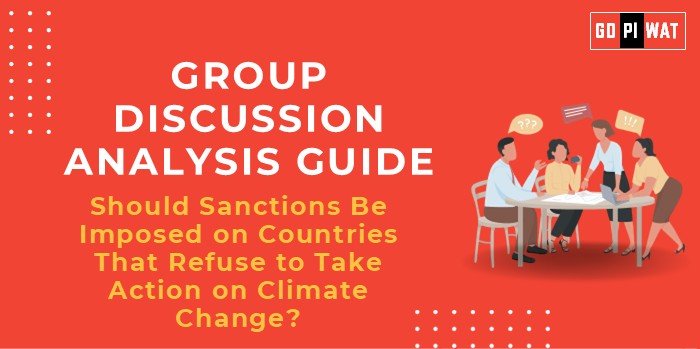📋 Group Discussion Analysis Guide
🌍 Should Sanctions Be Imposed on Countries That Refuse to Take Action on Climate Change?
🌟 Introduction to the Topic
📖 Opening Context: Climate change is a pressing global issue, with rising temperatures, extreme weather events, and shifting ecosystems highlighting the urgent need for collective action. Yet, some countries delay or refuse to take adequate steps, raising ethical, environmental, and economic questions about enforcing global climate responsibility through sanctions.
📜 Topic Background: Sanctions as a tool have historically been employed to influence nations’ behaviors on issues like nuclear proliferation and human rights violations. Applying them to climate inaction introduces complex questions about fairness, feasibility, and effectiveness in the context of global interdependence.
📊 Quick Facts and Key Statistics
- 🌍 Global CO₂ Emissions (2023): 36.8 billion metric tons, with top contributors including China, the US, and India. (Source: Global Carbon Project)
- 💰 Climate Inaction Costs: Climate-related disasters cost $270 billion in 2022 globally. (Source: Munich Re)
- 📜 Paris Agreement Commitments: Over 190 countries pledged to limit global warming to 1.5°C, but many are off-track.
- 🟢 Green Fund Shortfall: Developed countries missed the $100 billion annual climate finance target for developing nations by 2020.
👥 Stakeholders and Their Roles
- 🏛️ Governments: Set climate policies and targets; enforce or resist international norms.
- 🏢 Private Sector: Major emissions contributors (e.g., energy, transport); key players in innovation.
- 🌍 Citizens and Activists: Pressure for accountability and climate justice.
- 🌐 International Organizations: UNFCCC, IPCC, and WTO play roles in setting frameworks and monitoring.
- 🌱 Developing Nations: Demand equitable responsibility-sharing and access to funds.
🏆 Achievements and Challenges
🌟 Achievements:
- 📜 Paris Agreement: A landmark step in global climate policy cooperation.
- ⚡ Renewable Energy Growth: Solar and wind energy adoption surged 22% in 2022 globally.
- 📉 Carbon Markets: Emerging systems like the EU ETS have reduced emissions by 40% since 1990.
⚠️ Challenges:
- 🌍 Economic Inequality: Sanctions could disproportionately hurt developing nations.
- 📏 Policy Gaps: Enforcement mechanisms for climate inaction are underdeveloped.
🌍 Global Comparisons:
- ✅ Success: The EU leads with strict carbon pricing, integrating sustainability into its trade policies.
- ⚠️ Challenges: Some nations lag due to socio-economic constraints and lack of resources.
✨ Structured Arguments for Discussion
- 💬 Supporting Stance: “Sanctions incentivize compliance, ensuring global accountability for climate goals.”
- ⚖️ Opposing Stance: “Sanctions penalize economically weaker nations and hinder collaborative progress.”
- 🔄 Balanced Perspective: “Sanctions can be effective but must be paired with support systems like green financing.”
🎯 Effective Discussion Approaches
📖 Opening Approaches:
- Highlight economic and environmental impacts of climate inaction, e.g., $270 billion in global disaster costs in 2022.
- Use case studies like the EU’s carbon border tax or US-China tensions on emissions to illustrate key points.
🔄 Counter-Argument Handling:
- Address fairness by advocating differentiated responsibilities for developed and developing nations.
- Highlight successful transitions as models for compliance rather than punitive measures.
📈 Strategic Analysis of Strengths and Weaknesses
- 💪 Strengths: Enforces accountability, aligns with global goals, creates incentives for clean energy transitions.
- ⚠️ Weaknesses: Risks of trade wars, potential to exacerbate economic inequalities.
- 💡 Opportunities: Innovation in green technologies, leadership roles for proactive nations.
- 🚨 Threats: Resistance from powerful non-compliant countries, potential economic instability in sanctioned regions.
📚 Connecting with B-School Applications
- 🌟 Real-World Applications: Climate finance projects, policy analysis on sanctions, and green tech entrepreneurship.
- 💬 Sample Interview Questions:
- “Should global trade policies include environmental compliance clauses?”
- “How can B-schools contribute to climate solutions?”
- 📖 Insights for Students:
- Understand the rising importance of ESG (Environmental, Social, Governance) in business strategy.
- Analyze the policy impacts on global supply chains and sustainability goals.


